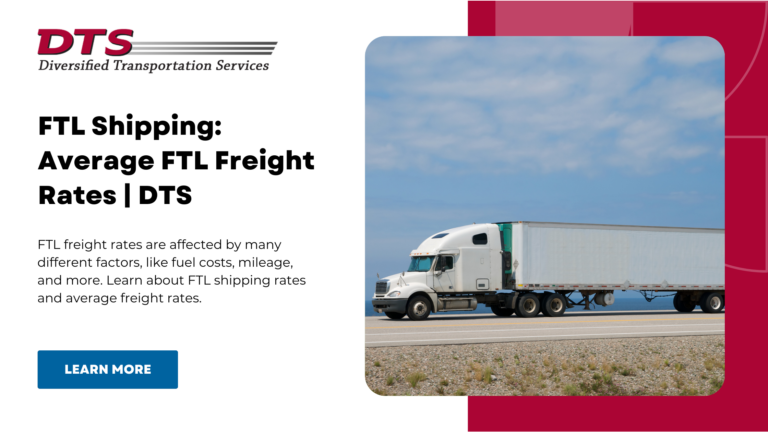
FTL freight rates are often changing, which makes it difficult for businesses to budget and plan. Knowing exactly how much you need to pay for full truckload (FTL) shipping is important for businesses because it allows them to manage their finances better.
Several factors affect FTL freight rates, including fuel prices, mileage, and seasonality. In this post, we will break down these factors to help you understand how they can influence FTL freight rates.
It is worth noting that FTL freight rates are very different from pricing for less-than-truckload (LTL) shipping. FTL rates do not reflect what items are being shipped. Instead, businesses simply pay for the entire truck — the only variable is mileage. This means you would pay the same rate if the truck were at capacity or only half full. LTL freight rates have more variables, such as the amount and type of goods you are sending.
Learn more about the differences between FTL and LTL shipping.
Staying up-to-date on the average freight rates can help you plan your shipments. Here are some average freight rates per mile as of May 2024, according to DAT Freight & Analytics:
Freight companies often also offer spot rates, which are not guaranteed in the long term. These prices will change quickly based on market conditions. As of May 2024, the spot rates for van, flatbed, and reefer hire are lower than the contract rate.
While subject to fewer variables than LTL freight, FTL freight rates can vary based on several factors, including:
Mileage is one of the main factors in FTL freight rates. Longer distance trips will result in higher costs because the carrier needs to cover fuel, driver wages, and maintenance costs. Longer journeys may also incur additional costs due to tolls.
The destination of your shipment may also affect FTL freight rates, for example, if the destination is out of the carrier’s typical service area.
Shipping is highly seasonal, which can cause FTL freight rates to fluctuate depending on the time of year. Peak season occurs in the fall as retailers stock up ready for the holidays and the back-to-school rush is in full swing. This is when FTL shipping demand is at its highest and costs will rise to reflect supply and demand. FTL freight rates will be reduced during the early months in the year as retail shopping dies down and demand for FTL services are lower.
Learn more about shipping seasonality and how it affects FTL freight rates.
Last-minute shipments typically have a higher price tag. Carriers prefer longer lead times to help them plan ahead and ensure efficient operations. Shipments with short lead times are typically subject to spot rates, which can vary daily depending on market conditions.
Fuel prices are an important factor when looking at FTL freight rates. The fuel market is highly volatile, so most freight quotes will include a fuel surcharge based on the current price per gallon for fuel.
Slower shipping times can offer lower costs. Next-day delivery will come at a premium, especially if your goods need to travel large distances. Planning shipments in advance and opting for longer shipping times will save you money on FTL shipments in the long run.
Another way your shipment's contents can affect price is the equipment required for the carrier to handle it. Not all shipments will be suited to a regular truck, meaning the carrier needs to use alternative vehicles to transport your goods.
For example, if a business needs to transport produce from the manufacturer to its warehouse, the carrier will need to provide a refrigerated truck (reefer) or vented van. Oversized loads will also incur additional fees as the carrier may need to secure permits and escort vehicles.
Partnering with DTS for your shipments can help you secure the best FTL freight rates, thanks to our team of shipping professionals. Our team has over 30 years of experience with all types of freight shipping, which means we can provide cost-effective pricing and exemplary customer service. Get in touch today to see how we can help.
Whether you're a company looking to improve one facet of your supply chain, your entire supply chain, or simply looking for a transportation and logistics consultation, we can help.